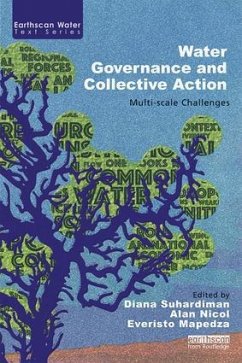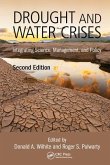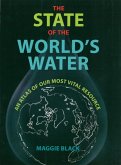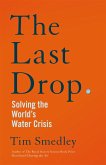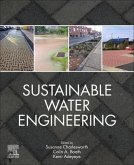Water Governance and Collective Action
Multi-scale Challenges
Herausgeber: Nicol, Alan; Mapedza, Everisto; Suhardiman, Diana
Water Governance and Collective Action
Multi-scale Challenges
Herausgeber: Nicol, Alan; Mapedza, Everisto; Suhardiman, Diana
- Broschiertes Buch
- Merkliste
- Auf die Merkliste
- Bewerten Bewerten
- Teilen
- Produkt teilen
- Produkterinnerung
- Produkterinnerung
This book examines concepts and practices of collective action that have emerged in recent decades globally.
Andere Kunden interessierten sich auch für
![Drought and Water Crises Drought and Water Crises]() Drought and Water Crises63,99 €
Drought and Water Crises63,99 €![The State of the World's Water The State of the World's Water]() Maggie BlackThe State of the World's Water18,99 €
Maggie BlackThe State of the World's Water18,99 €![The Last Drop The Last Drop]() Tim SmedleyThe Last Drop19,99 €
Tim SmedleyThe Last Drop19,99 €![Heavy Metals in Water Heavy Metals in Water]() Heavy Metals in Water260,99 €
Heavy Metals in Water260,99 €![Sustainable Water Engineering Sustainable Water Engineering]() Sustainable Water Engineering130,99 €
Sustainable Water Engineering130,99 €![The Water Book The Water Book]() Alok JhaThe Water Book15,99 €
Alok JhaThe Water Book15,99 €![Ferrocement Water Tanks Ferrocement Water Tanks]() Felicity LeeFerrocement Water Tanks13,99 €
Felicity LeeFerrocement Water Tanks13,99 €-
-
-
This book examines concepts and practices of collective action that have emerged in recent decades globally.
Hinweis: Dieser Artikel kann nur an eine deutsche Lieferadresse ausgeliefert werden.
Hinweis: Dieser Artikel kann nur an eine deutsche Lieferadresse ausgeliefert werden.
Produktdetails
- Produktdetails
- Earthscan Water Text
- Verlag: Taylor & Francis Ltd
- Seitenzahl: 190
- Erscheinungstermin: 13. September 2017
- Englisch
- Abmessung: 241mm x 171mm x 12mm
- Gewicht: 330g
- ISBN-13: 9781138040595
- ISBN-10: 1138040592
- Artikelnr.: 48818292
- Herstellerkennzeichnung
- Libri GmbH
- Europaallee 1
- 36244 Bad Hersfeld
- 06621 890
- Earthscan Water Text
- Verlag: Taylor & Francis Ltd
- Seitenzahl: 190
- Erscheinungstermin: 13. September 2017
- Englisch
- Abmessung: 241mm x 171mm x 12mm
- Gewicht: 330g
- ISBN-13: 9781138040595
- ISBN-10: 1138040592
- Artikelnr.: 48818292
- Herstellerkennzeichnung
- Libri GmbH
- Europaallee 1
- 36244 Bad Hersfeld
- 06621 890
Diana Suhardiman is a Senior Researcher and Leader of the Research Group Governance and Gender, at the International Water Management Institute (IWMI), based in Vientiane, Lao PDR. Alan Nicol is a Principal Researcher and Leader of the Strategic Program Sustainable Growth, at the International Water Management Institute (IWMI), based in Addis Ababa, Ethiopia. Everisto Mapedza is a Senior Researcher and Institutional Scientist, at the International Water Management Institute (IWMI), based in Accra, Ghana.
1. Introduction 2. Power and Politics in Water Governance: Revisiting the
Role of Collective Action in the Commons 3. The Collective is Political:
Lessons from the Nile Basin Initiative 4. Grassroots Scalar Politics in the
Peruvian Andes: Mobilising Allies to Defend Community Waters in the Upper
Pampas Watershed 5. Hydro-Hegemony or Water Security Community? Collective
Action, Cooperation and Conflict in the SADC Transboundary Security Complex
6. Place Attachment and Community Resistance: Evidence from the Cheay Areng
and Lower Sesan 2 Dams in Cambodia 7. Politics of Knowledge and Collective
Action in Health Impact Assessment in Thailand: The Experience of Khao
Hinsorn Community 8. Agricultural Water Management in Matrilineal Societies
of Malawi: Land Ownership and Implications for Collective Action 9.
Collective Action, Community and the Peasant Economy in Andean Highland
Water Control 10. Collective Action and Governance Challenges in the Tonle
Sap Great Lake, Cambodia 11. Goldmining, Dispossessing the Commons, and
Multi-Scalar Responses: The Case of Cerro de San Pedro, Mexico 12. Key
Constraints and Collective Action Challenges for Groundwater Governance in
the Eastern Gangetic Plains 13. Stakeholder Perspectives on Transboundary
Water Cooperation in the Indus River Basin 14. Reimagining South Asia:
Hopes for an Indus Basin Network 15. Structure, Agency, and Challenges for
Inclusive Water Governance at Basin Scale: Comparing Mekong with the Nile
16. Synthesis: Power, Alliances and Pathways for Collective Action
Role of Collective Action in the Commons 3. The Collective is Political:
Lessons from the Nile Basin Initiative 4. Grassroots Scalar Politics in the
Peruvian Andes: Mobilising Allies to Defend Community Waters in the Upper
Pampas Watershed 5. Hydro-Hegemony or Water Security Community? Collective
Action, Cooperation and Conflict in the SADC Transboundary Security Complex
6. Place Attachment and Community Resistance: Evidence from the Cheay Areng
and Lower Sesan 2 Dams in Cambodia 7. Politics of Knowledge and Collective
Action in Health Impact Assessment in Thailand: The Experience of Khao
Hinsorn Community 8. Agricultural Water Management in Matrilineal Societies
of Malawi: Land Ownership and Implications for Collective Action 9.
Collective Action, Community and the Peasant Economy in Andean Highland
Water Control 10. Collective Action and Governance Challenges in the Tonle
Sap Great Lake, Cambodia 11. Goldmining, Dispossessing the Commons, and
Multi-Scalar Responses: The Case of Cerro de San Pedro, Mexico 12. Key
Constraints and Collective Action Challenges for Groundwater Governance in
the Eastern Gangetic Plains 13. Stakeholder Perspectives on Transboundary
Water Cooperation in the Indus River Basin 14. Reimagining South Asia:
Hopes for an Indus Basin Network 15. Structure, Agency, and Challenges for
Inclusive Water Governance at Basin Scale: Comparing Mekong with the Nile
16. Synthesis: Power, Alliances and Pathways for Collective Action
1. Introduction 2. Power and Politics in Water Governance: Revisiting the
Role of Collective Action in the Commons 3. The Collective is Political:
Lessons from the Nile Basin Initiative 4. Grassroots Scalar Politics in the
Peruvian Andes: Mobilising Allies to Defend Community Waters in the Upper
Pampas Watershed 5. Hydro-Hegemony or Water Security Community? Collective
Action, Cooperation and Conflict in the SADC Transboundary Security Complex
6. Place Attachment and Community Resistance: Evidence from the Cheay Areng
and Lower Sesan 2 Dams in Cambodia 7. Politics of Knowledge and Collective
Action in Health Impact Assessment in Thailand: The Experience of Khao
Hinsorn Community 8. Agricultural Water Management in Matrilineal Societies
of Malawi: Land Ownership and Implications for Collective Action 9.
Collective Action, Community and the Peasant Economy in Andean Highland
Water Control 10. Collective Action and Governance Challenges in the Tonle
Sap Great Lake, Cambodia 11. Goldmining, Dispossessing the Commons, and
Multi-Scalar Responses: The Case of Cerro de San Pedro, Mexico 12. Key
Constraints and Collective Action Challenges for Groundwater Governance in
the Eastern Gangetic Plains 13. Stakeholder Perspectives on Transboundary
Water Cooperation in the Indus River Basin 14. Reimagining South Asia:
Hopes for an Indus Basin Network 15. Structure, Agency, and Challenges for
Inclusive Water Governance at Basin Scale: Comparing Mekong with the Nile
16. Synthesis: Power, Alliances and Pathways for Collective Action
Role of Collective Action in the Commons 3. The Collective is Political:
Lessons from the Nile Basin Initiative 4. Grassroots Scalar Politics in the
Peruvian Andes: Mobilising Allies to Defend Community Waters in the Upper
Pampas Watershed 5. Hydro-Hegemony or Water Security Community? Collective
Action, Cooperation and Conflict in the SADC Transboundary Security Complex
6. Place Attachment and Community Resistance: Evidence from the Cheay Areng
and Lower Sesan 2 Dams in Cambodia 7. Politics of Knowledge and Collective
Action in Health Impact Assessment in Thailand: The Experience of Khao
Hinsorn Community 8. Agricultural Water Management in Matrilineal Societies
of Malawi: Land Ownership and Implications for Collective Action 9.
Collective Action, Community and the Peasant Economy in Andean Highland
Water Control 10. Collective Action and Governance Challenges in the Tonle
Sap Great Lake, Cambodia 11. Goldmining, Dispossessing the Commons, and
Multi-Scalar Responses: The Case of Cerro de San Pedro, Mexico 12. Key
Constraints and Collective Action Challenges for Groundwater Governance in
the Eastern Gangetic Plains 13. Stakeholder Perspectives on Transboundary
Water Cooperation in the Indus River Basin 14. Reimagining South Asia:
Hopes for an Indus Basin Network 15. Structure, Agency, and Challenges for
Inclusive Water Governance at Basin Scale: Comparing Mekong with the Nile
16. Synthesis: Power, Alliances and Pathways for Collective Action

